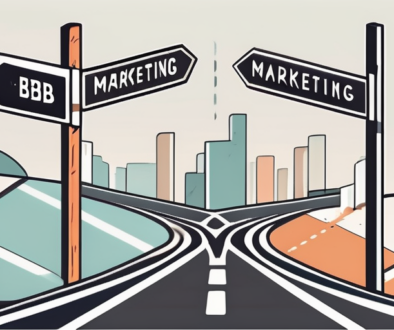Winning in B2B: Proven Strategies
In today’s fast-paced business environment, the B2B space is becoming increasingly competitive. As more companies recognize the potential for growth and profitability in this sector, it’s crucial to have a solid strategy in place to stay ahead of the competition. In this ultimate guide, we will dive deep into the world of B2B and explore the strategies that can lead to success.
Understanding the B2B Landscape
Before we delve into the strategies, it’s important to have a clear understanding of the B2B landscape. B2B, or business-to-business, refers to transactions between two or more businesses. Unlike B2C (business-to-consumer) transactions, B2B deals typically involve larger order quantities and longer sales cycles. In addition to these differences, B2B transactions often require customized solutions tailored to the specific needs of the business, leading to more complex negotiations and agreements.
Furthermore, the B2B landscape is characterized by a focus on building long-term partnerships rather than short-term transactions. This emphasis on relationship-building means that trust and credibility play a significant role in B2B interactions. Businesses must prioritize transparency and reliability to establish and maintain successful B2B relationships.
Key Characteristics of B2B Markets
B2B markets have some unique characteristics that set them apart from B2C markets. Firstly, decision-making in B2B is often a collective process involving multiple stakeholders. Each stakeholder may have different priorities and concerns, making the decision-making process more intricate and time-consuming. Understanding and addressing the needs of each stakeholder is crucial for closing deals in the B2B space.
Secondly, B2B buyers are driven by specific needs and goals, such as cost reduction or increased efficiency. Unlike individual consumers, B2B buyers are focused on achieving tangible business outcomes rather than personal preferences. This results in a more rational and analytical approach to purchasing decisions, where ROI and long-term value take precedence.
Finally, building strong relationships and trust is crucial in the B2B space. Due to the complexity and high stakes involved in B2B transactions, trust serves as the foundation of successful partnerships. Establishing trust requires consistent communication, reliability, and a deep understanding of the client’s business needs and challenges.
The Role of Digital Transformation in B2B
In recent years, digital transformation has revolutionized the B2B space. The advent of technology has enabled businesses to streamline processes, enhance communication, and reach a wider audience. Embracing digital transformation is no longer a choice; it’s a necessity for success in the B2B landscape. By leveraging digital tools such as data analytics, AI, and automation, businesses can gain valuable insights, improve operational efficiency, and deliver personalized experiences to their B2B clients.
Moreover, digital transformation has reshaped traditional marketing and sales strategies in the B2B sector. Online platforms, social media, and e-commerce channels have become essential tools for reaching and engaging B2B buyers. The shift towards digital interactions has accelerated the pace of business transactions and opened up new opportunities for collaboration and innovation in the B2B ecosystem.
Developing a Robust B2B Strategy
Now that we have a broader understanding of B2B, let’s dive into the strategies that can help drive success.
When it comes to developing a robust B2B strategy, there are several key factors to consider beyond just setting clear business objectives, identifying your target audience, and creating a value proposition. One crucial aspect is establishing strong relationships with your B2B partners. Building trust and fostering long-term partnerships can lead to mutual growth and success. Collaborating closely with your partners can also result in innovative solutions and a competitive edge in the market.
Setting Clear Business Objectives
As with any business endeavor, setting clear objectives is paramount to success. When developing your B2B strategy, take the time to define your goals and align them with your overall business objectives. Whether it’s increasing market share, improving customer retention, or expanding into new markets, having clear objectives will provide a roadmap for your B2B success.
Another critical aspect of a robust B2B strategy is staying agile and adaptable in a constantly evolving business landscape. Being able to pivot quickly in response to market changes or emerging trends can give your business a competitive advantage. Embracing innovation and being open to new ideas can help your B2B strategy stay relevant and effective in the long run.
Identifying Your Target Audience
To effectively market in the B2B space, it’s crucial to identify your target audience. Conduct market research to gain insights into the needs, pain points, and preferences of your potential customers. By understanding your target audience, you can tailor your marketing efforts to address their specific needs, thereby increasing your chances of success.
Creating a Value Proposition
A strong value proposition is essential in the B2B space. Clearly communicate the unique value your product or service offers and explain why it’s superior to competitors. Highlight the benefits and ROI (return on investment) your potential customers can expect. A compelling value proposition will help differentiate your business and attract potential buyers.
Essential B2B Marketing Techniques
Now that we have a solid B2B strategy in place, let’s explore some of the essential marketing techniques to maximize success in this space.
When diving into the realm of B2B marketing, it’s crucial to understand the importance of establishing a strong online presence. In today’s competitive landscape, having a well-rounded digital marketing strategy is key to standing out among competitors and reaching your target audience effectively.
Content Marketing for B2B
In today’s digital age, content marketing has become a powerful tool for B2B businesses. By creating valuable and educational content, you can establish your business as a thought leader and build trust with potential customers. Develop a content marketing strategy that aligns with your target audience’s interests and pain points, and distribute it through various channels to reach a wider audience.
Furthermore, incorporating search engine optimization (SEO) best practices into your content can help improve your visibility online and drive organic traffic to your website. By optimizing your content for relevant keywords and providing valuable information to your audience, you can enhance your brand’s credibility and attract more qualified leads.
Leveraging Social Media in B2B
While social media is often associated with B2C marketing, it can also be a valuable platform for B2B businesses. Platforms like LinkedIn provide opportunities to connect with industry professionals, showcase thought leadership, and generate leads. Develop a social media strategy that aligns with your target audience’s preferences and engage with relevant communities to build your brand and attract potential customers.
In addition to LinkedIn, platforms like Twitter and Facebook can also be effective tools for B2B marketing. By sharing industry insights, engaging with followers, and participating in relevant conversations, you can increase brand awareness and establish your business as a reputable source of information within your industry.
Email Marketing in the B2B Space
Email marketing remains a powerful tool in the B2B space. Develop targeted email campaigns to nurture leads, communicate with existing customers, and promote new products or services. Personalize your email content to resonate with your recipients and ensure that your email campaigns align with your overall marketing strategy.
Moreover, implementing marketing automation tools can streamline your email marketing efforts and help you deliver timely and relevant content to your audience. By segmenting your email lists based on specific criteria and automating personalized email sequences, you can enhance the effectiveness of your campaigns and drive higher engagement rates.
Sales Strategies in the B2B Space
With a solid marketing foundation, let’s turn our attention to sales strategies that can drive success in the B2B space.
Building Strong Relationships with Clients
In the B2B space, building strong relationships with clients is crucial. Focus on providing exceptional customer service, maintaining open lines of communication, and delivering on your promises. Building trust and loyalty will not only lead to repeat business but also result in positive referrals, which can be invaluable in the B2B world.
Imagine this: you’ve just closed a deal with a new client. They are impressed with your product or service, and the level of service they received during the sales process. Now, it’s time to take it a step further. By going above and beyond in your customer service, you can solidify the relationship even further. Offer personalized recommendations, provide ongoing support, and be proactive in addressing any concerns or issues that may arise. These small gestures can make a big impact and set you apart from your competitors.
Implementing a Sales Funnel
A well-defined sales funnel is essential for B2B success. Understand your customers’ journey and develop a sales funnel that guides them from the awareness stage to the purchase stage. Identify touchpoints and develop strategies to engage and nurture leads at each stage of the funnel, ensuring a seamless and engaging experience for your potential customers.
Let’s dive deeper into the sales funnel. At the top of the funnel, you have the awareness stage, where potential customers become aware of your brand and offerings. This is where your marketing efforts come into play, creating awareness through targeted advertising, content marketing, and social media campaigns. As prospects move down the funnel, they enter the consideration stage, where they are evaluating different options and comparing solutions. This is the perfect opportunity to showcase your expertise and provide valuable content that helps them make an informed decision. Finally, at the bottom of the funnel, you have the purchase stage, where the prospect becomes a customer. Here, it’s important to have a smooth and efficient sales process, ensuring a seamless transition from prospect to customer.
The Importance of Follow-ups in B2B Sales
Follow-ups are often underestimated in the B2B space. A timely and personalized follow-up can make all the difference in closing a deal or nurturing a lead. Develop a robust follow-up strategy that prioritizes lead engagement and keeps your business top of mind for potential customers.
Consider this scenario: you’ve had an initial conversation with a potential client, and they seemed interested in your product or service. However, they haven’t made a decision yet. This is where follow-ups come into play. By reaching out to them, you not only remind them of your offering but also show that you value their business. Personalize your follow-ups by referencing specific points from your previous conversation, and offer additional information or resources that can help them in their decision-making process. By staying proactive and persistent, you increase your chances of converting that lead into a loyal customer.
In conclusion, success in the B2B space requires a strategic approach. By understanding the B2B landscape, setting clear objectives, leveraging digital transformation, and implementing effective marketing and sales strategies, you can position your business for success in this highly competitive market. Stay tuned for more insights and tips in our ultimate guide to B2B success!



